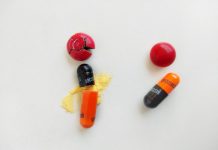Guest Post by Heather Rudalavage, RD
Aspartame is an artificial sweetener that many people turn to when they are attempting to lose weight. And, it is one of the top researched food ingredients of all time.
The theory is that since it contains zero calories, you can consume your favorite sweetened beverages without the guilt or weight gain. Unfortunately, the jury still seems to be out on that theory. What many consumers may not realize is that some findings suggest that, not only does substituting aspartame for sugar not lead to weight loss, but it can actually lead to weight gain over long term use. The opposite of the desired effect.
Recent studies suggest that artificial sweetener users don’t lose any more weight or weigh any less than those who use sugar, long term. That’s a fact. Wondering why? There are a few theories:

- Theory 1: Using artificial sweetener causes people to overcompensate in other ways. For example, ordering an extra value meal at the drive through and thinking it’s okay because you are getting a diet soda to drink. Sorry, but this math just doesn’t add up because a typical extra value meal with a quarter pounder and fries contains over 800 calories without a drink. Having a diet soda is a mute point
- Theory 2: Using artificial sweetener attunes our palettes to expect things to taste cloyingly sweet. Once your tongue is used to that super sweet taste of an artificial sweetener, a piece of raw fruit may seem bland. So, we eat less whole foods and begin to crave more processed and sweetened foods.
- Theory 3: High consumers of artificial sweeteners also tend to be chronic dieters or those who restrict their (or their child’s) caloric intake. Since chronic dieters tend to gain weight over the long term, the fact that they also use artificial sweeteners can skew the data. In other words, it can look like aspartame is causing weight gain, but actually it is chronic dieting or caloric restriction.
- Theory 4: Using artificial sweeteners, specifically aspartame, stimulates your appetite and causes you to crave carbohydrates later. How does that happen? The reason comes down to the chemical makeup of aspartame. Aspartame provides over half of its content in a form of a phenylalanine isolate (aka sweet poison). Simply put, when your tongue tastes something sweet, your brain expects there to be accompanying calories to go along with the sweetness. When the calories don’t come, your brain is confused and sends out signals to cause you to crave carbohydrates. The ongoing cycle of disastrous eating habits all starting from fake sugar!
So, if you are left wondering which sweeteners are safe and which are not, here is the general rule of thumb: The USDA recommends using all sweeteners in moderation, this includes both natural sugar and artificial sweeteners. Natural sugar, honey and stevia are all safe to use but should still be used in moderation. If you have a medical condition such as diabetes the benefits of using an artificial sweetener in controlling blood sugar, may outweigh any negative side effects or risks.
 What is a sweet tooth to do? If you must drink your coffee sweetened, consider cutting back on the amount of coffee you consume or switch to tea. Next time you are looking for a fizzy drink, feel good about your bubbles by mixing your favorite 100% juice with some seltzer for a peppy drink without the guilt. Or, if you are looking for a sweet treat that your kids won’t refuse, try dipping fruit chunks in melted dark chocolate.
What is a sweet tooth to do? If you must drink your coffee sweetened, consider cutting back on the amount of coffee you consume or switch to tea. Next time you are looking for a fizzy drink, feel good about your bubbles by mixing your favorite 100% juice with some seltzer for a peppy drink without the guilt. Or, if you are looking for a sweet treat that your kids won’t refuse, try dipping fruit chunks in melted dark chocolate.
You will find an equal amount of studies that say aspartame and other artificial sweeteners such as sacharin are safe and say aspartame is harmful, but in the end, the one concept we know to be a true is that the less processed, and closer to nature a food is the better it is for your health.
Read more from Intuitive Nutrition.
What are your thoughts on aspartame? Do you have any sweet tooth satisfiers? Share them below!
Photo 1 courtesy of Sarah Korf via Flickr (CC BY-SA 3.0)
Photo 2 courtesy of Steve Snodgrass via Flickr (CC BY 3.0)









![Daily Bite [Make]: Philly Cheesesteak Stuffed Bell Peppers](https://dashofwellness.com/wp-content/uploads/2013/01/Philly-Cheesesteak-Stuffed-Pepper-Daily-Bite-1-100x70.png)

Great post! I’ve never bee a soda drinker, but my husband was so addicted years ago. He finally researched how bad soda is for the body and is down to one or two sodas per week {not perfect, but better than the 6-pack he used to drink EACH DAY}.
Tell your husband that he is on the right path! Soda is pretty lousy nutritionally! And, I think for most people it just becomes a habit, not something they are consciously, mindfully choosing. I used to mindlessly order a soda every time I ate out, because that was just something I always did, finally it dawned on me that I could just order water with lemon, duh!
Great post! I’ve never bee a soda drinker, but my husband was so addicted years ago. He finally researched how bad soda is for the body and is down to one or two sodas per week {not perfect, but better than the 6-pack he used to drink EACH DAY}!
My mother in law is actually super sensitive to aspartame and gets wicked headaches and nausea/dizziness from it! The doctors did a diet study and blamed the additive — since quitting it she’s doing so so so much better! I try to avoid it like the plague and switched to unsweet teas, black coffee, and try to pick healthier gum when I chew it at all.. though that one is hard to avoid since they love sneaking it in almost every sugar-free gums! Any suggestion for a good one to try?
Yes, she is not the first person I have heard that got headaches from aspartame. Hmmm, sugar free gum that doesn’t have aspartame, I’ll have to look into that. I don’t know of any off hand. What a great question!
Yes my husband was having dizzy spells and we started researching on aspartame and it had so many negative affects on people. We never drank the stuff since. I’m always checking the labels for it and not buying the product if it is in it. We are surprised it hasn’t been pulled from the market yet!